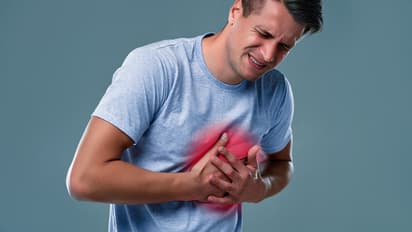Health Guide: Heart Attack or Gas Pain? Know the Key Differences

Synopsis
Experiencing chest pain? Learn how to distinguish between gas pain and a heart attack. This article provides essential information to help you understand the differences.
Sudden chest pain can be alarming, often leading to fears of a heart attack. However, not all chest pain is heart-related. It's crucial to understand that conditions like gas, heartburn, and acidity can also cause chest pain, often lasting only a few seconds and relieved by walking, burping, or passing gas. However, chest pain should always be monitored carefully. Here are five ways to differentiate between a heart attack and gas-related chest pain.
1. Location of Pain:
Heart Attack Pain: Typically felt in the center or left side of the chest, characterized by pressure, tightness, or a heavy feeling. This pain can radiate to other body parts like the left arm, neck, back, shoulder, and jaw.
Gas Pain: Often feels like a muscle spasm or sharp, stabbing pain, usually located in the upper abdomen or lower chest. Unlike heart attack pain, it doesn't typically spread to other body areas.
2. Duration:
Heart Attack Pain: Lasts for an extended period, often several minutes or more, and may come and go, worsening over time.
Gas Pain: Temporary and usually subsides after burping, passing gas, or a bowel movement. Changing positions, applying gentle pressure to the abdomen, or taking a short walk can also provide relief.
3. Accompanying Symptoms:
Heart Attack Pain: May include shortness of breath, dizziness, lightheadedness, nausea, vomiting, palpitations, and excessive sweating. Seek immediate medical attention if you experience any of these symptoms along with chest pain.
Gas Pain: Accompanied by bloating, excessive burping, passing gas, and a feeling of fullness in the abdomen. While it doesn't cause the same symptoms as a heart attack, it can sometimes trigger anxiety.
4. Causes:
Heart Attack Pain: Caused by a blockage of blood flow to the heart, often due to a blood clot or narrowed arteries. Emotional stress or physical exertion can also trigger a heart attack, which can be life-threatening.
Gas Pain: Results from a buildup of air or gas in the digestive system. Eating or drinking too quickly, consuming spicy or fatty foods, indigestion, and acid reflux can also contribute to gas pain. This type of pain is not life-threatening.
5. Medications:
Heart Attack Pain: Cannot be relieved by digestive medications, antacids, or gas relievers. Immediate emergency treatment is necessary to restore blood flow to the heart, as it can be life-threatening.
Gas Pain: Can be alleviated with digestive aids, gas relievers, and antacids. Drinking warm water, taking a short walk, and avoiding gas-inducing foods can also help.
Explore the latest Lifestyle News covering fashion, wellness, travel, Food and Recipes, and more. Stay updated with trending Health News, fitness tips, and expert insights to inspire your daily living. Discover personalized lifestyle trends that keep you stylish and informed. Download the Asianet News Official App from the Android Play Store and iPhone App Store for everything that adds value to your everyday life.